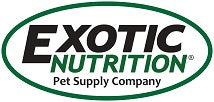Unsafe Foods for Degus: Keeping Your Furry Friends Safe
Degus are delightful and energetic rodents known for their social nature and intelligence. As responsible pet owners, it's crucial to be mindful of what we feed our degus to ensure their health and well-being. While degus have specific dietary requirements, there are certain foods that can be harmful to them if consumed. In this blog post, we'll explore the types of foods that degus should avoid and why, as well as recommend some suitable products from Exotic Nutrition to meet their nutritional needs.

Toxic Foods
First and foremost, it's essential to be aware of foods that are toxic to degus. These foods can be outright poisonous and should be completely avoided:
-
Rabbit Food: Some commercial rabbit foods may contain coccidiostat, an ingredient that is toxic to degus. It's crucial to read labels carefully and choose foods specifically formulated for degus to avoid any potential harm.
-
Chocolate: Chocolate contains theobromine, a compound that is toxic to many animals, including degus. Even small amounts of chocolate can be dangerous and should be kept away from your furry friends.
-
Caffeine: Like chocolate, caffeine is toxic to degus and can cause serious health issues if ingested. Keep caffeinated beverages and foods away from your degus at all times.
Unsafe Foods
Unsafe foods may not be toxic to degus, but they can still cause harm or injury due to their attributes. Here are some examples:
-
Cabbage: Cabbage can cause bloating in degus, leading to digestive discomfort and potentially more severe health issues.
-
Sugar and Molasses: Degus cannot metabolize sugar and molasses effectively, which can lead to obesity, dental problems, and other health issues.
-
Starchy Foods: Foods high in carbohydrates, such as bread and pasta, should be limited in a degu's diet.
Unhealthy Foods
While some foods may not cause lasting harm to degus, they should still be avoided due to their negative impact on health. Here are some examples:
-
Nuts and Seeds: High-fat and high-protein foods like nuts and seeds should be limited in a degu's diet to prevent obesity and other health issues.
-
Fruit: While fruit can be a tasty treat for degus, it's high in sugar and should be fed sparingly to avoid weight gain and dental problems.
-
Carrots: Carrots are another food that is high in sugar and should be offered in moderation to prevent health issues in degus.
Exotic Nutrition Products for Degus
Ensuring your degus receive a balanced diet is essential for their health and well-being. Exotic Nutrition offers a range of high-quality products specifically formulated for degus:
-
Degu Diet with Whole Oats Degu Food: This specially formulated degu diet contains whole oats and other nutritious ingredients to meet the dietary needs of degus.
-
Timothy Hay Cubes Rabbit & Guinea Pig Food: Timothy hay is an essential part of a degu's diet, providing fiber and promoting dental health. These hay cubes are an excellent option for providing your degus with the fiber they need.
-
Rodent Blocks Rodent Food: Rodent blocks are a convenient way to ensure your degus receive essential vitamins and minerals. Exotic Nutrition's rodent blocks are specially formulated for the dietary needs of degus.
-
Veggie Blend: This veggie blend is a tasty and nutritious option for degus. Made with a variety of vegetables, it provides essential nutrients and variety to your degu's diet.

Conclusion
By being aware of foods that are toxic, unsafe, or unhealthy for degus, you can help ensure your furry friends stay happy and healthy. Provide them with a balanced diet consisting of high-quality food specifically formulated for degus, such as those offered by Exotic Nutrition, and consult with a veterinarian if you have any concerns about your degu's diet or health.
For more information on feeding degus and ensuring their well-being, check out Exotic Nutrition's resources on degu care and nutrition, or consult with an accredited veterinarian.
Ready to Shop? Shop By Pet or Shop By Category
Got Questions? Browse more free Blogs or Contact Us with any inquiries regarding our products.
Notice: Exotic Nutrition cannot provide specific care guidelines on an individual basis. Please consult a veterinarian or experienced breeder.
Exotic Nutrition is proud to serve hundreds of universities, zoological parks, veterinarians, research centers and other institutions seeking to advance the health and well-being of exotics worldwide. See a full list of institutions using our products here.
Exotic Nutrition has a heart for animals in need. Through regular donations to rescues, rehabilitators, and special fundraiser events, Exotic Nutrition is making a significant impact in the lives of animals. See a full list of our charitable donations here.

Leave a Comment